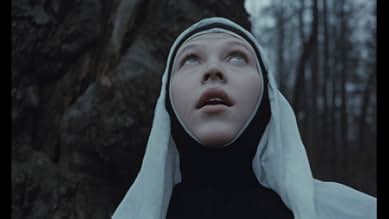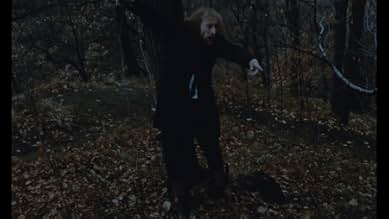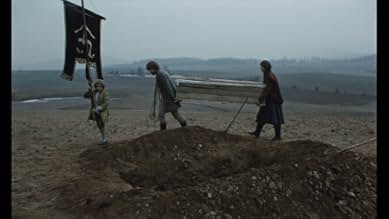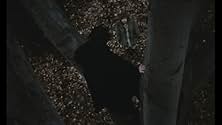IMDb-BEWERTUNG
7,0/10
3228
IHRE BEWERTUNG
Füge eine Handlung in deiner Sprache hinzuYoung Polish noble Jakub, freed during 1793 Prussian invasion, experiences father's death, betrayal. Traumatized, he follows his savior, committing brutal murders across the country.Young Polish noble Jakub, freed during 1793 Prussian invasion, experiences father's death, betrayal. Traumatized, he follows his savior, committing brutal murders across the country.Young Polish noble Jakub, freed during 1793 Prussian invasion, experiences father's death, betrayal. Traumatized, he follows his savior, committing brutal murders across the country.
- Regie
- Drehbuch
- Hauptbesetzung
Empfohlene Bewertungen
During the joint Russian,German (Prussian) and Austrian invasion to Poland in 1793, a young Polish nobleman Jacob is saved from the imprisonment by a stranger who wants in return to obtain a list of Jacob's fellow conspirators. It is a bargain. Maybe implicitly, Jakub sold his life to this stranger, following his mysterious savior across the country, Jacob becomes a witness to chaos and moral corruption that is ensuing the partition and dissolution of Poland by the neighbor countries. People everywhere seems to gone mad and crazy, including Jacob's own family and his beloved girlfriend.
Being apparently demented by what he has seen, he, amidst his own delerium of his consciousness fading away, commits noumerus of gory and enigmatic killings derailing in social and political turmoil by mass murders, leading to insanity and desperation. This stranger, who acts as a guide, displays horrific sights of this physically and morally destroyed 18th-Century nation, whispering the actions of Jakub and acting as an evil motor. But there is free will in Jakub as well, which remains unquestionable.
The film was immediately banned by the censors of the then-communist Polish government and the director was soon forced to leave Poland. Almost two decades later, in the last days of communism in Poland, Zulawski have somehow obtained a copy of his film from censorship vaults and immediately presented it during nearest film festival in Tokyo in 1988. Albeit very late, the film premiere has had received a lot of applause from viewers and film critics alike.
Zulawski's invigorating style shines as brightly as ever, his vision of insanity displayed at every corner, its a world fueled by animal instincts and sexual deviance, permeated with enough filth to make the devil dance in joy. Where each frame is filled with details that are caught by the eye either consciously or subconsciously. Camera management is aggressive and intrepid, never giving up, never hesitating to the depiction of scandalous content, shifting tones and creating authentic psychological horror with remarkable success.
It is as ugly as it is mesmerizing. Andrzej Zulawski's cinema is the definition of madness, the real meaning of insanity, and the truth of the quest of craziness. This film Diabel is flawlessly made, perfectly filmed, completely insane, profoundly depicted. With the typical emotional attacks of anger and madness expressed by the various characters. He represents an absolute and incontrovertible chaos, subjecting the vision to a frenetic and frustrating horror. In Diabel, Zulawski seems to point out we should stop worrying about the Devil since it is already Hell on Earth...
Being apparently demented by what he has seen, he, amidst his own delerium of his consciousness fading away, commits noumerus of gory and enigmatic killings derailing in social and political turmoil by mass murders, leading to insanity and desperation. This stranger, who acts as a guide, displays horrific sights of this physically and morally destroyed 18th-Century nation, whispering the actions of Jakub and acting as an evil motor. But there is free will in Jakub as well, which remains unquestionable.
The film was immediately banned by the censors of the then-communist Polish government and the director was soon forced to leave Poland. Almost two decades later, in the last days of communism in Poland, Zulawski have somehow obtained a copy of his film from censorship vaults and immediately presented it during nearest film festival in Tokyo in 1988. Albeit very late, the film premiere has had received a lot of applause from viewers and film critics alike.
Zulawski's invigorating style shines as brightly as ever, his vision of insanity displayed at every corner, its a world fueled by animal instincts and sexual deviance, permeated with enough filth to make the devil dance in joy. Where each frame is filled with details that are caught by the eye either consciously or subconsciously. Camera management is aggressive and intrepid, never giving up, never hesitating to the depiction of scandalous content, shifting tones and creating authentic psychological horror with remarkable success.
It is as ugly as it is mesmerizing. Andrzej Zulawski's cinema is the definition of madness, the real meaning of insanity, and the truth of the quest of craziness. This film Diabel is flawlessly made, perfectly filmed, completely insane, profoundly depicted. With the typical emotional attacks of anger and madness expressed by the various characters. He represents an absolute and incontrovertible chaos, subjecting the vision to a frenetic and frustrating horror. In Diabel, Zulawski seems to point out we should stop worrying about the Devil since it is already Hell on Earth...
A cinematic masterpiece as if Dante Alighieri and Marquis de Sade got high together, took notes in their altered state, and then had Pink Floyd compose the soundtrack.
Imagine waking up from a dream, not knowing where you are, how you got there, or why everyone around you is speaking in a language that makes no sense to you. For anyone like me-who has devoted two-thirds of their life to alcohol and similar indulgences-it's an easy feeling to empathize with. But now, add another layer: not just being out of place in a physical sense, but feeling displaced in time itself.
When you finally snap out of it, you realize the entire world has changed. Your old world has literally burned to the ground, and as if caught in a trance, your mind and body are left wandering aimlessly through the wreckage of the apocalypse.
There's no need for elaborate metaphors. As of 2025, anyone who has lived through the past two decades into middle age can relate to this feeling.
Zulawski's film-like all of his works-isn't for everyone. As I've frequently written on my Letterboxd and IMDb accounts, cinema, in general, shouldn't be for everyone... But we lost that battle.
Many people claim that Possession features Sam Neill and Isabelle Adjani at their worst, but the truth is, Zulawski and all his films-including that one-deserve immense respect.
Criterion, hear our plea-add this man's entire filmography to your collection.
Imagine waking up from a dream, not knowing where you are, how you got there, or why everyone around you is speaking in a language that makes no sense to you. For anyone like me-who has devoted two-thirds of their life to alcohol and similar indulgences-it's an easy feeling to empathize with. But now, add another layer: not just being out of place in a physical sense, but feeling displaced in time itself.
When you finally snap out of it, you realize the entire world has changed. Your old world has literally burned to the ground, and as if caught in a trance, your mind and body are left wandering aimlessly through the wreckage of the apocalypse.
There's no need for elaborate metaphors. As of 2025, anyone who has lived through the past two decades into middle age can relate to this feeling.
Zulawski's film-like all of his works-isn't for everyone. As I've frequently written on my Letterboxd and IMDb accounts, cinema, in general, shouldn't be for everyone... But we lost that battle.
Many people claim that Possession features Sam Neill and Isabelle Adjani at their worst, but the truth is, Zulawski and all his films-including that one-deserve immense respect.
Criterion, hear our plea-add this man's entire filmography to your collection.
Andrzej Zulawski's 'The Devil' is a real oddity from the early 1970s. Originally released in 1972, but banned at the behest of the Catholic church, it has been little seen, which is a pity, because it is a fascinating movie that deserves a larger audience. Reminiscent at times of Jodorowsky and sometimes Fellini, this is a very puzzling movie steeped in religious symbolism.
In 18th Century Poland the Prussian army are in the process of conquering the country. In the midst of this chaos a mysterious figure arrives at a convent with orders to escort a political prisoner. The prisoner, a young man named Jakub, was accused of attempting to murder the King. The man finds Jakub, and along with a young nun they flee the oncoming troops. Once they are safe Jakub is freed and urged to return home. When he arrives he finds that nothing is as before. His father burnt down the family home before committing suicide, his pregnant fiancee has married one of his friends, and his mother is a whore. Jakub is constantly described by others as being a lunatic or "sick" yet in many ways he appears to be the sanest one of the lot. To complicate matters the man who initially rescued him shadows his every move and seems to have a strange agenda of his own. Is Jakub mad or is the world? Who is the enigmatic stranger and what does he want of Jakub? 'The Devil' will appeal to fans of strange, multi-layered movies.
In 18th Century Poland the Prussian army are in the process of conquering the country. In the midst of this chaos a mysterious figure arrives at a convent with orders to escort a political prisoner. The prisoner, a young man named Jakub, was accused of attempting to murder the King. The man finds Jakub, and along with a young nun they flee the oncoming troops. Once they are safe Jakub is freed and urged to return home. When he arrives he finds that nothing is as before. His father burnt down the family home before committing suicide, his pregnant fiancee has married one of his friends, and his mother is a whore. Jakub is constantly described by others as being a lunatic or "sick" yet in many ways he appears to be the sanest one of the lot. To complicate matters the man who initially rescued him shadows his every move and seems to have a strange agenda of his own. Is Jakub mad or is the world? Who is the enigmatic stranger and what does he want of Jakub? 'The Devil' will appeal to fans of strange, multi-layered movies.
The previous poster calls the cruelty at display in this film "inhuman". Oh really? How come then that people slaughter people, gouge their eyes out, cut their limbs or burn them alive? Or torture them? Or rape and mutilate women? He should read some reports about practices during the Bosnian war or wars in Africa, about the stuff people have been doing to other people for ages, for reasons like religion, greed or lust. Or for no reasons at all. It took real "balls" or creative guts from the filmmaker to do a film like that. I am fed up with the political correctness and general blandness of films, caused by the requirements of market and profits, or by mere cowardliness. I could understand criticism of the cruelty if it was purely gratuitous but it is not. This film has artistic values and touches upon important topics. I am happy it was not destroyed and all copies not locked up somewhere. It could probably happen in Hollywood or in the lands like Iran.
Thick smoke, nuns and screams. Crazy people and blood. Intense lighting and use of colour amidst the chaos. Each frame seems crowded - either through closeup or frenzy; moments of stillness are rare. Who is the stranger who saves Jakub? Why the nun? The madness of his surroundings - acrobats and theatricals, dancers and whores, mirror the insanity of the world. There is no goodness here. Monstrosity is the only answer.
WUSSTEST DU SCHON:
- WissenswertesThe film was banned in communist Poland.
- VerbindungenFeatured in Brows Held High: Häxan (2012)
Top-Auswahl
Melde dich zum Bewerten an und greife auf die Watchlist für personalisierte Empfehlungen zu.
- How long is The Devil?Powered by Alexa
Details
Zu dieser Seite beitragen
Bearbeitung vorschlagen oder fehlenden Inhalt hinzufügen



























